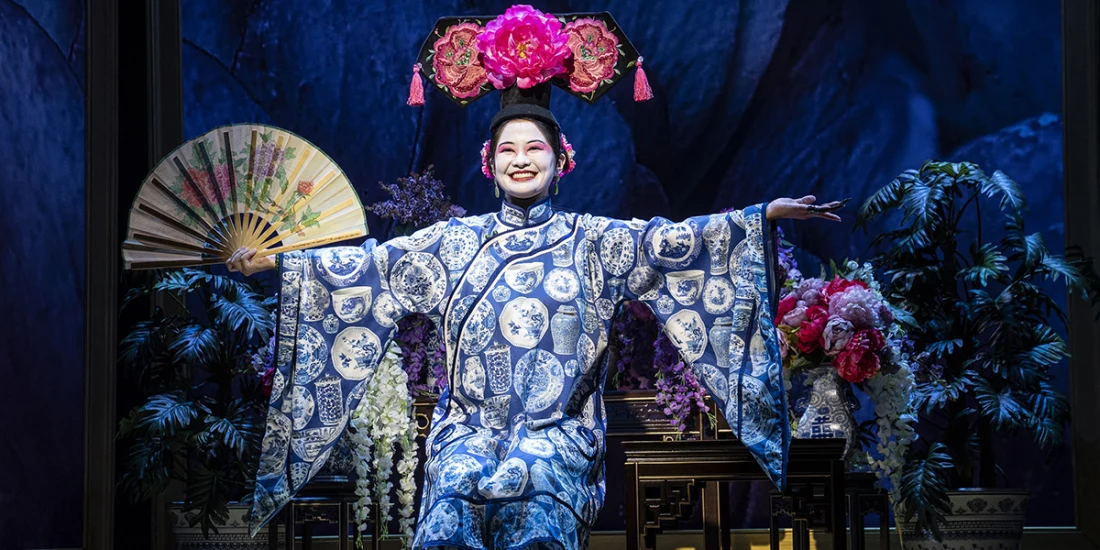'The Chinese Lady' review — an evocative exploration of cultural difference
The caged bird in Lloyd Suh's The Chinese Lady carries the full weight of history on her shoulders. Afong Moy, the first-known woman to arrive in the U.S. from China, was presented as a novelty attraction for Americans who paid 25 cents admission. Here, she speaks from behind a gilded frame and through time, exploring her role as an object of cultural exchange while asserting her obvious humanity.
It's a double act of history and drama that urgently addresses the present moment, amid an alarming spike in harassment and hate crimes against Asian-Americans. (The play was initially presented at Barrington Stage Company in July 2018.) Under the direction of Ma-Yi Theater Company's artistic director Ralph B. Peña, the production at The Public Theater is an evocative and eye-opening excavation of difference and a seductive appeal for greater understanding.
It's 1834 and Afong Moy (Shannon Tyo) is 14-years-old, she tells the audience. She was born in Guangzhou Province, the youngest of seven, and sold to traders of Far East imports to New York, where she's now being presented as a museum exhibit. She and the square room where she sits are intended to be representative of China. Of course, both are symbolic émigrés. "This room is unlike any room in China," she says. "And I am unlike any lady to ever live."
Afong is attended by a translator and sometime handler, Atung (Daniel K. Issac), whom they wrly agree is "irrelevant" — because he's not on display, and is figured as a cipher for information. Though Afong addresses the audience herself, in unaccented English, whether or not she actually possesses a voice remains an open question.
Afong's sale was only meant to last two years, but here she is at 16, and again at 29. "You want to understand more about the world," she addresses onlookers with naivete at the outset, her face painted white. The years tick by, her makeup comes off, and Afong's veil seems to lift each time she performs the same routine — reciting her origins, walking on bound feet, pouring herself tea. As an adult, downgraded from museum exhibit to cheap circus wonder, she moves into recounting the exploitation of Chinese people during her lifetime in the U.S., as railroad laborers and targets for exclusion and attack.
Formally, Suh's play is presentational, a study of captivity and vehicle for lesser known histories. If the staging feels hemmed in and nearly claustrophobic, that would seem by design. While Atung paces in front, Afong remains trapped behind a frame, the abundance of artificial flowers and greenery around her fading and disappearing with time (set design is by Junghyun Georgia Lee and projections by Shawn Duan). Her finery serves as a sort of mask (the intricate costumes are by Linda Cho). She longs for escape, but where would it lead?
Suh's play excels when Afong and Atung spar directly, moments positioned as asides to Afong's primary mode of storytelling. It's easy to wish the pair would break out of their fated repetition for more behind-the-scenes, no-bullshit looks into the muck of performing one's difference for others' benefit, and engage with each other and the world more fully. That would also seem by design.
Tyo does remarkable work embodying Afong over a half-century span, incrementally transforming from something like a doll, her voice high and almost grating, into a woman shouldering the impossible weight of representing East to West. Isaac likewise performs a subtly astounding transformation of character, animating a so-called irrelevant puppet into a weary and conflicted older man.
The Chinese Lady goes beyond an indictment of the imperial gaze, peering through the space that allows someone to be considered an other and asking what it's made of. Ignorance, yes. But also curiosity, desire, and a wish to understand. With any hope, that's also what brings people to the theatre.
Photo credit: Shannon Tyo in Ma-Yi Theater Company's production of The Chinese Lady. (Photo by Joan Marcus)
Originally published on
